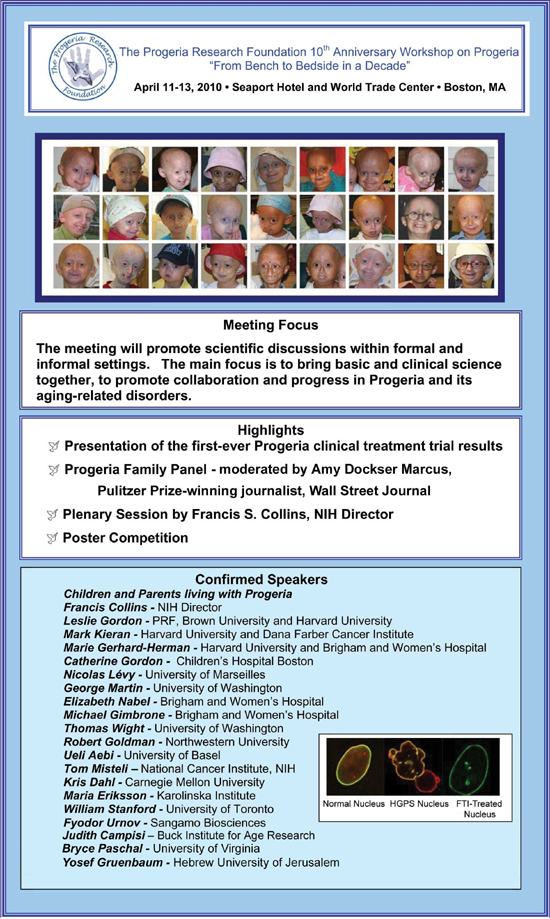
Meeting Summary for the 2010 Progeria Research Foundation Workshop: From Bench to Bedside In a Decade
Click here to watch the Family Panel featuring 3 children and their families, and the Plenary Address by PRF Medical Director Dr. Leslie Gordon entitled Progeria: From Obscurity to Treatment Trials and Beyond!
From April 11-13, PRF held its 6th Scientific Meeting at the Seaport Hotel and World Trade Center in Boston, MA. A record 140 attendees congregated from 10 different countries to hear expert oral presentations and view a record-breaking 36 poster presentations. Doctors and scientists – who often work in separate worlds, either in the clinic or in the lab – inspired one another as they came together to share cutting-edge findings and directions for future research. The depth and breadth of research into Progeria grows stronger with every meeting. Speakers included leading scientists in the fields of heart disease, aging, genetics, and lamins.
The stage was set during the first evening with a Progeria Family Panel, moderated by Pulitzer prize-winning Wall Street Journalist, Amy Dockser Marcus. Researchers had a unique chance to meet some of the people their work could help: Hayley Okines and her parents, Mark and Kerry, from England; Devin Scullion, along with his mom Jamie and step-dad Shawn, from Canada; and Zach Pickard, with his parents Tina and Brandon, from Kentucky. Hayley, Devin, and the adults talked about what it’s like to live with Progeria, and answered questions from the attendees who wanted to better understand how they can continue to help the children.
The family panel was followed by a plenary talk with Leslie Gordon, PRF’s Medical Director, introduced her son Sam. “She’s been there for me all my life,” he said, “She’s been a great influence, along with everyone else in The Progeria Research Foundation, and she happens to be my mother, so that’s like a bonus!” Dr. Gordon brought us through a journey from obscurity, through gene discovery, on to treatment trials, and presented a vision of where the field is headed in the push towards new treatments and a cure.
“Thanks to all of this year’s workshop attendees for becoming part of the Progeria research community – you are an incredibly dedicated group of scientists. Your discoveries are our past, and will be our future.” – PRF Medical Director Dr. Leslie Gordon during her inspiring plenary presentation about the state of Progeria research.
“This year’s workshop clearly set a new benchmark,” said Michael Gimbrone. “It was one of the most interactive and informative meetings of its kind I have ever attended. The spirit of the meeting was remarkably collaborative, upbeat and inspiring—especially for the younger participants.”
Scientific Session Topics:
Clinical Trials in Progeria: The American and European teams conducting the world’s first Progeria clinical drug trials opened the scientific presentations. US trial Principal Investigator Mark Kieran (Dana Farber Cancer Institute, Boston) and trial co-coordinator Leslie Gordon presented an overview of trial design, baseline analyses, and toxicity, pharmacokinetics, and other aspects of the FTI clinical trial, designed to create a comprehensive baseline and detailed clinical description of Progeria. Marie Gerhard-Herman (Brigham and Women’s Hospital, Boston) described the dramatic vessel wall abnormalities in Progeria, and Catherine Gordon (Children’s Hospital Boston (CHB)) presented growth and bone health as a distinct skeletal dysplasia which shows some unique abnormalities through testing during the clinical trial. Nicolle Ullrich (CHB) discussed her novel findings on the natural history of neurovascular disease and stroke in Progeria, most notably the silent strokes that can occur early in the lives of children with Progeria. Finally, Nicolas Lévy (University of Marseille, France) presented exciting preliminary results from their Phase II treatment trial for Progeria and laminopathies with pravastatin and zoledronic acid, the two non-FTI drugs involved in the triple drug trial.
Aging, Cardiovascular Disease, and Progeria: George Martin (University of Washington) addressed unanswered questions regarding the pathogenesis of the vascular pathology associated with normative aging and Progeria. Elizabeth Nabel, (Brigham & Women’s Hospital, Boston) described the commonalities between cardiovascular disease in Progeria and the aging population as demonstrated in both progeria mouse models and in human pathology specimens.. Michael Gimbrone, (PRF grantee, Brigham & Women’s Hospital) described the importance of endothelial cell influence on heart disease in Progeria and on normal aging. PRF grantee Thomas Wight (Benaroya Research Institute at the Univ. of Washington) presented his key findings on the extracellular matrix integrity in vasculature and other tissues of Progeria mouse models and human pathological specimens. Finally, Yosef Gruenbaum, (Hebrew University, Israel) talked about drug and genetic manipulations of prenylation and methyl esterification in a new worm model he has developed to study lamins.
Lamin Biochemistry and Pathophysiology:
Lamin is the normal protein counterpart to progerin, which causes disease in Progeria. The more we understand lamins, the better we can understand Progeria. In this session, former PRF grantee Robert Goldman (Northwestern U., Chicago) addressed lamins as essential building blocks of nuclear architecture. Ueli Aebi, (Univ. of Basel, Switzerland) presented the structure and assembly of wild-type and disease variants of human lamins A/C. PRF grantee Kris Dahl, (Carnegie Mellon University, PA) presented her data on the multi-scale mechanical changes in progerin-expressing cells. Maria Eriksson, (Karolinska Institute, Sweden) demonstrated the effects of stem cell depletion in a mouse model of Progeria. Stem calls are the early cells that can develop into all mature cell types in our bodies. Finally, PRF grantee Bryce Paschal, (U. of Virginia) presented his discoveries on defects in the Ran GTPase system in HGPS.
Cutting Edge Strategies for Research and Discovery
PRF grantee Tom Misteli, (National Cancer Institute, NIH) brought us a glimpse of the future, with a thrilling presentation on the status of drug development in Progeria. Fyodor Urnov, (Sangamo Biosciences, CA) then took us to the realm of genetic therapies for Progeria by proposing we apply human gene editing with engineered zinc finger nucleases to treat Progeria in the future. PRF grantee William Stanford, (Univ. of Toronto, Canada) then brought us to the cutting edge by developing induced pluripotent stem cells (iPS cells) in Progeria and laminopathies. These are cells that start in a mature state , such as skin cells, but are genetically “reversed” in the laboratory and become pluripotent stem cells. From that state, the cells can be differentiated into many cell types, including vascular cells. These iPS cells will be invaluable for studying Progeria in the near future. Finally, PRF Medical Research Committee member Judy Campisi,(Buck Institute for Age Research and Lawrence Berkeley National Laboratory, CA) brought her expertise to bear with new insights and new targets for Progeria, aging and the inflammation that affects them both.
- Young investigators took the stage, with two poster abstracts were elevated to oral presenations. Giovanna Lattanzi,( Institute for Molecular Genetics, Italy) presented data on prelamin A in diverse tissues, What happens in health and disease? Ylva Rosengardten, (Karolinska Institute, Sweden) presented her work on Embryonic expression of the HGPS mutation in epidermis.
- The Poster session, boasting 36 cutting edge projects, displayed the many new directions Progeria research is headed in. Congratulations to John Graziotto(Mass. General Hospital, Charlestown), who won best basic science poster on “Lamin A and Progeria Degradation: Influence of Farnesyltransferase Inhibitors,” and to Kelly Littlefield (CHB) who won best clinical poster on “Progeria Clinical Trials: Patient Life at Children’s Hospital Boston.”
In his closing remarks, Dr. Robert Goldman called the workshop presentations “exciting and provocative,” and predicted that everyone will return for the next workshop with even more exciting findings.
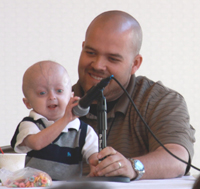 Zach is a real crowd-pleaser as he Zach is a real crowd-pleaser as heyells out “Hi!” to the audience. |
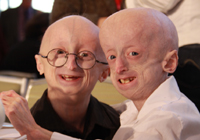 Sam and Devin, both 13 years old, hang out together during the welcoming dinner. |
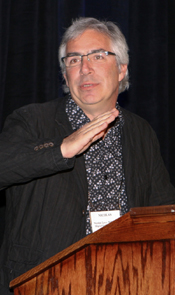 Nicolas Lévy, MD, PhD, Professor of Human and Molecular Genetics, head of the Medical Genetics Department and of the Inserm Research Center, and Director of the French National Institute for Rare Diseases. |
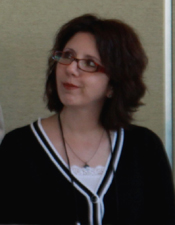 Amy Dockser Marcus Amy Dockser Marcus |
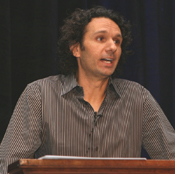 Tom Misteli, PhD, Director of the Cell Biology of Genomes Group at the National Cancer Institute, NIH |
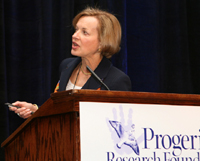 Elizabeth Nabel, MD, President of Brigham and Women’s/Faulkner Hospitals, Professor of Medicine, Harvard Medical School, and former Director of the National Heart, Lung, and Blood Institute at NIH |
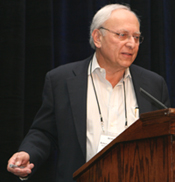 Robert D. Goldman, PhD, Stephen Walter Professor and Chair of the Department of Cell and Molecular Biology at the Feinberg School of Medicine at Northwestern University, and former President of the American Society of Cell Biology |
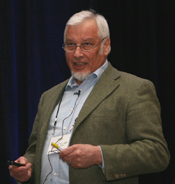 Ueli Aebi MA, PhD, Director of the M.E. Müller Institute for Structural Biology at the Biozentrum., University of Basel, Switzerland. |
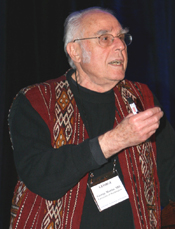 George Martin, MD, Professor Emeritus of Pathology and Director Emeritus of the Alzheimer’s Disease Research Center at the University of Washington School of Medicine, Scientific Director of the American Federation for Aging Research and former President of the Gerontological Society of America |
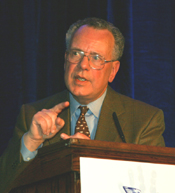 Michael Gimbrone, MD, Ramzi S. Cotran Professor of Pathology at Harvard Medical School, Chairman of the Department of Pathology at Brigham and Women’s Hospital |
